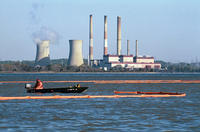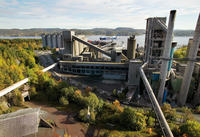-
New chemical sponge would lessen the carbon footprint of oil industry
U.K. scientists have discovered a ground-breaking technique with the potential dramatically to reduce the amount of energy used in the refinement of crude oil. The existing industrial process uses huge amounts of energy to separate and purify these gases, so the new technique has the potential to revolutionize the oil industry by significantly reducing carbon emissions and making the process more environmentally friendly.
-
-
Storing hydrogen underground could boost transportation, energy security
Large-scale storage of low-pressure, gaseous hydrogen in salt caverns and other underground sites for transportation fuel and grid-scale energy applications offers several advantages over above-ground storage, says a recent Sandia National Laboratories study sponsored by the Department of Energy’s Fuel Cell Technologies Office. Geologic storage of hydrogen gas could make it possible to produce and distribute large quantities of hydrogen fuel for the growing fuel cell electric vehicle market.
-
-
Using earthquake research to refine fracking methods
Researchers at Oklahoma State University (OSU) are using historical earthquake data to make oil and natural gas drilling more efficient. Members of the university research team found that hydraulic fracturing, or fracking, a process in which water and sand are blasted at high pressure into rock to remove oil, can cause an effect similar to earthquakes. Data gleaned from historical earthquake experiences have told scientists much about what happens to the rock during such events – and the knowledge may allow oil companies to understand how to extract gas without also removing groundwater.
-
-
Egypt thwarts terrorist attack on Israeli gas platforms in the Mediterranean Sea

Egypt said it had thwarted an attempt by Islamic State (ISIS)-affiliated Egyptian terrorists on 12 November to attack Israeli energy platforms in the Mediterranean Sea. The terrorists, members of the Ansar Bayt al-Maqdis terror group which operates in the Sinai Peninsula, commandeered an Egyptian navy missile boat for the planned attack. Other Egyptian navy vessels gave chase and stopped the commandeered missile boat, killing eight aboard in a heavy exchange of fire. In addition to attacking Israeli gas platform, the terrorists planned to attack Israeli ships.
-
-
Porous molecules bind greenhouse gases
While carbon dioxide presents the biggest greenhouse problem, several other compounds are hundreds or thousands of times more potent in their greenhouse effect per unit of mass. These compounds include Freons, used as common refrigerants, and fluorocarbons, highly stable organic compounds in which one or more hydrogen atoms have been replaced with fluorine. Chemistry researchers have developed a molecule that assembles spontaneously into a lightweight structure with microscopic pores capable of binding large quantities of several potent greenhouse gases.
-
-
Economists analyze Obama administration's Clean Power Plan
The Obama administration’s Clean Power Plan, released in June 2014 and seeking public comments until 1 December, aims to reduce carbon emissions from existing power plants by 30 percent (below 2005 levels) by 2030. An analysis of the Obama administration’s plan suggests that while the plan improves flexibility, allowing emissions to be reduced in cost-effective ways, additional reforms could permit further emissions reduction for the least cost.
-
-
Gas can be a “bridge fuel” to a low-carbon future

Major new suggests that gas could play an important role as a “bridging fuel” to a low-carbon economy, but warns that it will not be long before gas becomes part of the problem rather than the solution. The research combines the latest energy system modelling techniques with analysis of U.K. gas security to assess future demand.
-
-
Energy engineers call for new, less restrictive regulatory framework for fracking
Leading energy engineers are suggesting that U.K. regulations on the surface vibrations caused by shale gas fracking are unnecessarily restrictive. The engineers state in a new paper that widely applying restrictions similar to those currently in force on fracking would require a ban on heavy vehicles from passing houses or walking on wooden floors. They also state that the threat of serious earthquakes caused by fracking activity is considerably lower than commonly feared.
-
-
New technology reduces cost to capture carbon

The U.S. Department of Energy’s Savannah River National Laboratory (SRNL) has signed an Exclusive Rights Agreement with Partnering in Innovation, Inc. of Orlando, Florida, in support of new carbon capture technology. Originally developed at SRNL, this approach will help open global markets for cost-effective industrial carbon dioxide (CO2) capture and re-use.
-
-
Generating fuel from sunlight
Researchers have made significant progress towards developing a process of Artificial Photosynthesis (AP) that could replace the use of fossil fuels in the future. AP is the industrial process of preparing fuels and chemicals from nothing more than carbon dioxide, water and sunlight. It is a vital process that would be the foundation of a world that would no longer need fossil fuels.
-
-
Texas acts to reduce number of man-made earthquakes
The number of disposal wells in Texas has surged along with the number of drilling projects. Texas has more than 3,600 active commercial disposal wells. In 2013, the Railroad Commission approved 668 disposal well permits, twice the number of approvals in 2009. The growing number of disposal wells corresponds with an increase in earthquakes in communities where such seismic activity rarely existed.Officials in Texas have now taken steps to reduce the number of earthquakes caused by wells drilled for the disposal of oilfield waste.
-
-
State regulators discuss the connection between fracking and earthquake
Regulators from states with significant petroleum and natural gas exploration activities met last week in Columbus, Ohio as part of the 2014 Interstate Oil and Gas Compact Commission conference.One key topic of discussion at the conference wasthe potential implications of a study which found that numerous, unnoticeable earthquakes in Harrison County, Ohio, likely were linked to oil and natural gas exploration. 190 of the quakes which ranged from magnitude 1.7 to 2.2, occurred in the thirty-nine hours after fracking activity occurred at one well in late September and early October 2013.
-
-
Getting the salt out
The boom in oil and gas produced through hydraulic fracturing, or fracking, is seen as a boon for meeting U.S. energy needs. But one byproduct of the process is millions of gallons of water that’s much saltier than seawater, after leaching salts from rocks deep below the surface. Study shows electrodialysis can provide cost-effective treatment of salty water from fracked wells.
-
-
A boom in global natural gas, by itself, will not slow climate change
A new analysis of global energy use, economics, and the climate shows that without new climate policies, expanding the current bounty of inexpensive natural gas alone would not slow the growth of global greenhouse gas emissions worldwide over the long term. Because natural gas emits half the carbon dioxide of coal, many people hoped the recent natural gas boom could help slow climate change — and according to government analyses, natural gas did contribute partially to a decline in U.S. carbon dioxide emissions between 2007 and 2012. In the long run, however, according to this study, a global abundance of inexpensive natural gas would compete with all energy sources — not just higher-emitting coal, but also lower-emitting nuclear and renewable energy technologies such as wind and solar. Inexpensive natural gas would also accelerate economic growth and expand overall energy use.
-
-
Hydraulic fracturing caused earthquakes in Ohio
Hydraulic fracturing triggered a series of small earthquakes in 2013 on a previously unmapped fault in Harrison County, Ohio, according to a new study. This series of earthquakes is the first known instance of seismicity in the area. Hydraulic fracturing, or fracking, is a method for extracting gas and oil from shale rock by injecting a high-pressure water mixture directed at the rock to release the gas inside. The process of hydraulic fracturing involves injecting water, sand and chemicals into the rock under high pressure to create cracks. The process of cracking rocks results in micro- earthquakes.
-
More headlines
The long view
Trump Is Fast-Tracking New Coal Mines — Even When They Don’t Make Economic Sense
In Appalachian Tennessee, mines shut down and couldn’t pay their debts. Now a new one is opening under the guise of an “energy emergency.”
Smaller Nuclear Reactors Spark Renewed Interest in a Once-Shunned Energy Source
In the past two years, half the states have taken action to promote nuclear power, from creating nuclear task forces to integrating nuclear into long-term energy plans.
